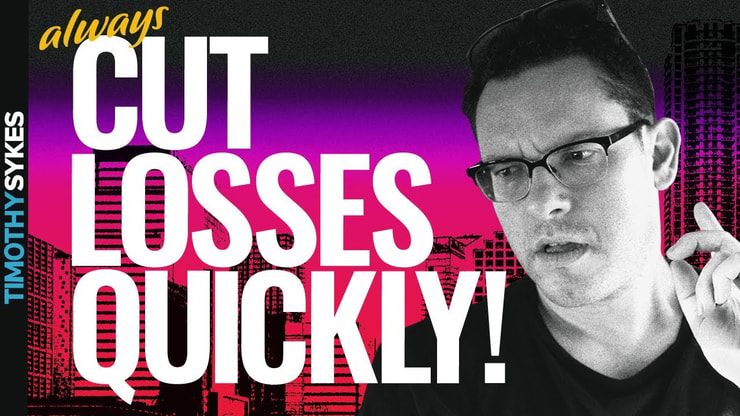Sometimes you’re going to misjudge things…
You think you’re in an A+ setup but before you can blink you’re already hitting out for a loss…
You can let this get to you, and it has for me several times throughout my career…
Or you can learn how to contain your mistakes and stay disciplined.
Because in this game, it’s not how much you make that matters, it’s how much you keep.
Trading is ALL about discipline and execution…retweet this if you promise to be patient/disciplined & meticulous in yurt trading! Who promises this?!
— Timothy Sykes (@timothysykes) December 22, 2023
Discover the 5 ways I keep my cool and stay disciplined.
Table of Contents
Monday Was Shaky For Me
On Monday I traded the ticker symbol IINN a whopping four times.
Not only did I over-trade it, I ended up losing money it.
There’s no other way to say it but I lost my discipline.
You can read about the trades from my journal right here:
Luckily I had a solid trade from my weekend trade in RKLB that kind of saved my day.
But I know how frustrating that is as a trader. You take one or two good trades that make 100% sense…then you take one or two sub-optimal setups and give up your gains.
Instead of sitting on profits, your discipline has you sitting flat or even at a loss.
So how do we get a hold of this before it becomes account threatening?
#1: Study Hard
Former NFL legend Tom Brady was notorious for his preparation. It was reported that he would watch 40 hours of film a week.
As a trader you want to be aware of:
- The latest market trends/catalysts
- When the best opportunities lie
- The type of stocks making moves
- What setups are working best in this market
- Where am I finding success and failure
- The market sentiment
8:50pm study check, who's still up studying, reviewing your @StocksToTrade scans or making your wachlist for tomorrow. While the $DIA $SPY $QQQ $IWM are all up substantially, the hype won't last forever so will you be ready to capitalize on the likely awesome upcoming dip buys?!
— Timothy Sykes (@timothysykes) December 27, 2023
While the market can be unpredictable, you still want to know where your strengths and weaknesses are…
In addition, what setups provide you the best chance to win.
When you’re trading…you’re playing the odds.
That’s why it’s critical you avoid low probability setups.
#2: Speak Up
Short sellers have been stinking the bed this year…
Daily reminder of how bad short sellers are doing in 2023 https://t.co/kb8jrWjuxp even though they don't post their losses on social media/in chatrooms since they're insecure cowards, we must be grateful for their sacrifice for the greater good. Thank you guys, MUCH appreciated!
— Timothy Sykes (@timothysykes) December 21, 2023
But you rarely hear about it.
Why?
Because many of them hide their big losses.
It’s easy to hide losses when no one sees them.
That’s why you should never trust them.
On the other hand, I believe in full transparency.
I show all my wins and losses. Regardless of how big or small they are.
I call out my trades to my students as well.
This helps me stay honest. If I tell them I am getting in at X level, with a profit target of X% and a stop level at X%…it helps me follow through.
Now, I’m not saying you need to be an open book like me.
But if you’re a trader who struggles to keep their word then maybe sharing your trade ideas can be helpful. Even if you do it anonymously in a chat room.
More Breaking News
- Bold Moves by Intuitive Machines: Analyzing the Soaring Momentum
- Vertiv Holdings Faces Challenges Amid Market Concerns: A Closer Look
- MicroStrategy’s Rollercoaster: Navigating the Bitcoin Price Decline and Strategy Updates
#3: Don’t Be A Slave To The Screen
Put me in front of the screen all day and I’ll likely over-trade.
I can’t help myself.
But that’s why I purposely get away from my screen during certain times of the trading day.
Day trading penny stocks can be stressful and emotional, especially when stocks are squeezing like they are now.
Some techniques that can help while you are in front of the screen are deep breathing exercises.
Also, make it a routine to get up, walk around, stretch, and eat.
This can help prevent impulsive decisions driven by fear and greed.
A BIG problem with the trading industry/Fintwit is that there are so many traders who grind so many hours every day and whether they are one of the few who profit by mastering the data/learning to control their emotions/discipline, or more likely they're part of the 90%+ who work… pic.twitter.com/Rh5Zjplqvj
— Timothy Sykes (@timothysykes) December 1, 2023
#4: Keep a Trading Journal
+20 years in the game…
And I’m still penciling in all my trades.
You’ll be shocked at how much better you trade when you start recording your trades, including the strategy used, the catalyst, and any emotional or psychological factors that influenced your decisions.
If you’d like to see how I’ve been journaling throughout the years, you see my journal here.
#5: Stay Risk Averse
We’re in a super weird market right now.
The worst stocks are offering the best plays.
The worst news is creating the craziest squeezes.
And the worst breakdowns are creating incredible dip buying opportunities.
Not only are these stocks moving quickly…they’re often unpredictable.
That’s why you must focus on your risk management.
Most importantly cutting losses.
Always be aware of how much you are willing to risk on each trade. And don’t let your ego interfere with you taking a loss.
These short sellers are winning 5-6 trades in a row and then getting destroyed on the next trade, wiping out all their gains and more.
Never trade a strategy you can’t manage risk on.
🌟Are You Ready to Master the Art of Cool & Disciplined Trading? 🌟
In the ever-twisting saga of the stock market, it’s not just about the gains – it’s about what you keep.
Like my rocky Monday with IINN or the surprising save with RKLB, trading is a rollercoaster. 🎢
🚀 Join my team in our exclusive live training sessions.
🔥 Learn how to stay disciplined, even when the market throws curveballs.
🔥 Get insights into my personal journaling techniques and risk management strategies.
🔥 Discover why it’s crucial to take breaks, speak up, and avoid being a screen slave.
It’s a treacherous market out there – weird, wild, and full of unexpected turns. 📉📈
But fear not! With the right approach, you can navigate these choppy waters.
Don’t let a bad day or a tough week derail your trading journey.
👁🗨 Witness firsthand how I tackle the market’s unpredictability.
Are you prepared to rise above the chaos?
Ready to transform your trading strategy from reactive to proactive?
Your guide to disciplined, profitable trading is just a click away.




Leave a reply